-Simitha T. Singam, August 1, 2015.
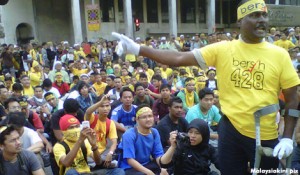 COMMENT Over the past few days, Malaysians have been forced to experience political maturity. From the cabinet reshuffling to the announcement of Bersih 4, Twitter and Facebook have been running wild with opinions, comments, photos, and the like.Being a social media addict myself, I’ve been engrossed in discussions regarding our beloved country, with strangers across political divides. However, something deeply troubles me – many of us do not understand our country.
COMMENT Over the past few days, Malaysians have been forced to experience political maturity. From the cabinet reshuffling to the announcement of Bersih 4, Twitter and Facebook have been running wild with opinions, comments, photos, and the like.Being a social media addict myself, I’ve been engrossed in discussions regarding our beloved country, with strangers across political divides. However, something deeply troubles me – many of us do not understand our country.We all know that Malaysia is – or so it is claimed to be – a democratic state. The legitimacy of Malaysia as a democratic state is open to debate, which shall be saved for another miserable night of analysis. But I digress. We Malaysians tend to smugly parrot our government in announcing that Malaysia is a multi-ethnic democratic nation with moderate Muslim views.
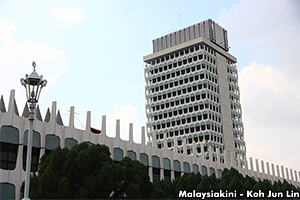 However, disturbingly, one too many of us fail to understand the meaning of democracy and subsequently, what it means to be a democratic nation.
However, disturbingly, one too many of us fail to understand the meaning of democracy and subsequently, what it means to be a democratic nation.
Too many Malaysians are prematurely concluding that street protests to pressure the government into making necessary reforms are undemocratic. Even our inspector-general of police, who clearly must have flunked Politics 101 and Democracy 101, seems to think so.
How is it that so many of us hold such inaccurate convictions ever so confidently? Could it be in our water, or in our hazy air, or is it simply just a strange genetic mutation that has plagued Malaysians? But of course, though Malaysia has been stranger than fiction lately, my suspicions hold no grounds.
It wasn’t too long until this fact became clear; it is actually very hard to blame the people for their gross misunderstanding.
The fault lies in the extensive state propaganda over the decades – from our media to our educational institutions – that has effectively misled our fellow Malaysians.
So instead of being bitter with the people that seem to accuse street protesters of being undemocratic and threatening Malaysia’s democracy, I decided to write this article.
People’s interest
Democracy, simply put, is the rule of the people, or people’s rule. In a representative democracy, the people grant elected representatives power to represent them and make decisions with their opinions and interests in mind.
It must be understood that representatives do not rule the people but merely make decisions pertaining to state governance on behalf of the people. This is a logical 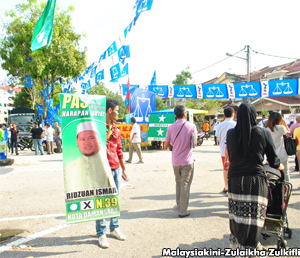 mechanism for the sake of functionality; can you imagine 30 million people sitting in the Parliament and governing a state?
mechanism for the sake of functionality; can you imagine 30 million people sitting in the Parliament and governing a state?
I imagine it to be something like a chaotic Chinese Whisper game; the message starting with “we must fight corruption” would end up in, “we’re out of nasi lemak!” and we Malaysians know how much chaos the latter can cause.
But coming back to representative democracy, we should be mindful that the power representatives hold are that which the people, as shareholders of a state, extend to them. Just to be extremely clear – representatives do not rule the people but they rule the state on behalf of the people, according to the people’s preferences.
Given that, in a functional democratic state, the people and elected representatives enter an agreement as soon one is voted in. In exchange for representational power, elected representatives are required to provide information to the voters and carry their opinions and interests in the Parliament, where decisions regarding the state and people’s well-being are made.
In this process, the people hold their elected representatives accountable for actions and non-actions. If or when elected representatives behave in a manner that opposes or breaks the above-mentioned agreement, the people are conferred with the right to demand justice. This is precisely where street protests come in.
Acting on our behalf
When a representative breaks the pact and is no longer accountable or simply perceived to no longer be accountable, the people within a democratic state possess the right to demand for answers and reforms by exercising their constitutional right to assemble peacefully. This right is granted in Article 10 of the Malaysian constitution – which is a democratic constitution.
To put our current situation into this context, Prime Minister Najib Abdul Razak is our representative. We elected our Members of Parliament to act on our behalf, and BN, having won more seats in the Parliament, went on to select him as the head representative of Malaysia. As said above, these politicians, including our prime 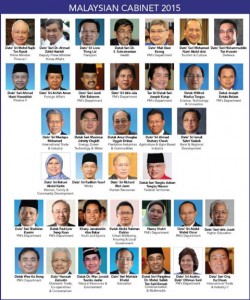 minister, do not rule us but instead rule on our behalf.
minister, do not rule us but instead rule on our behalf.
When politicians no longer take our opinions and interests into account, or simply govern the state in a manner that sacrifices our interests, it is our democratic right to demand for reform, and one way to do so is by exercising our constitutional right to assemble peacefully.
It is the channel that exists within a democratic society for the masses to show their displeasure and pressure the elected representatives to address pressing issues.
As such, the Bersih 4 rally and its participants are merely exercising their constitutional right and demanding that Najib, who is no longer perceived to be accountable and who has been perceived to have broken the representative agreement mentioned above, with mounting accusations of corruption and mismanagement to his name, be removed from the position of head representative of the Malaysian state.
Street protests a democratic action
This, bear in mind, is a democratic action. Street protests are simply just the people’s way of showing their displeasure in a people’s rule system.
On the flip side, preventing people from demanding reforms, even a change in leadership, by exercising their constitutional right to assemble peacefully, is that which is absolutely undemocratic.
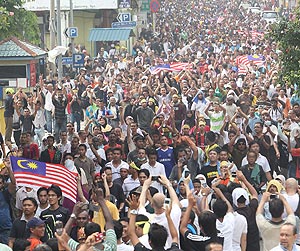 By threatening to arrest protest participants, the IGP has threatened the sanctity of Malaysia as a democratic state and jeopardised democratic justice.
By threatening to arrest protest participants, the IGP has threatened the sanctity of Malaysia as a democratic state and jeopardised democratic justice.
Without allowing people to participate in our state’s affairs, our leaders have pushed Malaysia into an authoritarian system, where a dictator and his flock oppressively rule the people instead of governing the state on behalf of the people.
This is unfortunately where Malaysia stands today. We no longer have the right to hold our representatives accountable and instead, are criminalised for questioning and resisting their iron fist.
In a nutshell, a democracy is made up of people’s participation, whether it is via voting or via street protests; and without such bottom-up participation, there is no democracy.
It is my wish that Malaysians realise that power in a true democracy lies in the hands of its citizens, and not the politicians. The moment we realise this, Malaysia will see greener pastures. Salam perjuangan!
SIMITHA T SINGHAM is the former programme officer of the Centre for Independent Journalism (CIJ) Malaysia and currently completing her Political Theory postgraduate course at the University of Manchester.
























